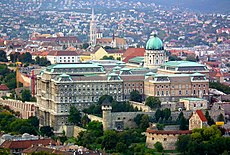Tiranis Phrontis
This article is incomplete because it is pending further input from participants, or it is a work-in-progress by one author. Please comment on this article's talk page to share your input, comments and questions. Note: To contribute to this article, you may need to seek help from the author(s) of this page. |
 | |
 Prosvity Palace, built in the 17th century for the academy | |
| Motto | Scientia vincit (Solarian) ("Knowledge triumphs") |
|---|---|
| Formation | May 9, 1640 |
| Headquarters | Samistopol, Narozalica |
Membership | 27 seats |
Provost | Piatro Suldesova |
| Website | tiranisphrontis.nr |
The Tiranis Phrontis (Ancient Piraean: Τιράνης Φροντίς; Tiránís Phrontís, TPh, Narodyn: Тіраніс Фронтіс; Tiranis Frontis, TF, lit. "Royal Phrontistery") is an academic organisation and learned society specialising in the sciences and mathematics in Narozalica. Comprised of the country's leading scientists, mathematicians and often other academic minds, the Phrontis, as it is often shorthandedly referred to, has been one of the highest ranking academic bodies in Narozalica since its inception, being the site of many scientific discoveries from the 17th century to the modern period.
Founded in 1640 by King Louis II, the Phrontis was named in Ancient Piraean due to its philosophical and educational connotations. The academy was initially comprised of scientists and scholars appointed directly by the king, but switched to an electoral system in 1650. The Phrontis was popularised as one of Euclea's foremost scientific bodies when member Lawrence Lugin, 1st Marquis of Krada discovered and proved the theory of universal gravitation at Prosvity Palace in 1643. The Phrontis attracted many scholastic minds from across Euclea through the 17th century, particularly from countries in the west. Lugin was later elected as the academy's inaugural Provost in 1660, splitting it into three sections of nine seats, referred to as "columns" – the Judamian column, named for Attiyah al-Judami, represented the sciences, the Ovidian column, named for Ovidus, represented philosophy, and the Hippodalian column, named for Hippodalia, represented religion. These columns are still retained in the Phrontis to this day, although their academic connotations have largely been lost.
The TPh is headquartered at the Prosvity Palace in Samistopol, a location it has kept since its foundation. Despite policies against the use of Piraean and Solarian in Narozalica, the Phrontis' prestige as an institution allowed it to retain its linguistic influences during the early republican period. Today, its purpose is mainly served in higher education, where the Phrontis specialises in delivering lectures and assisting students with transitions into university-level STEM subjects.